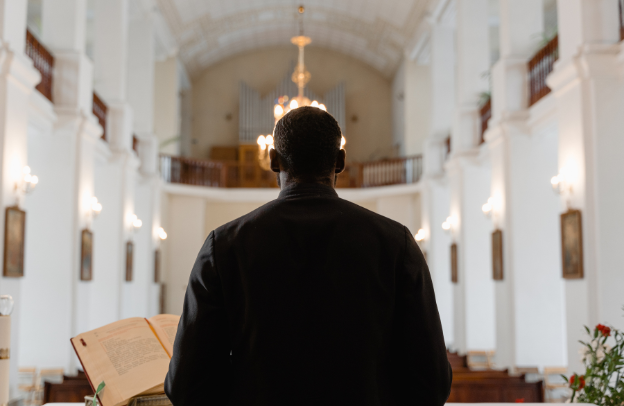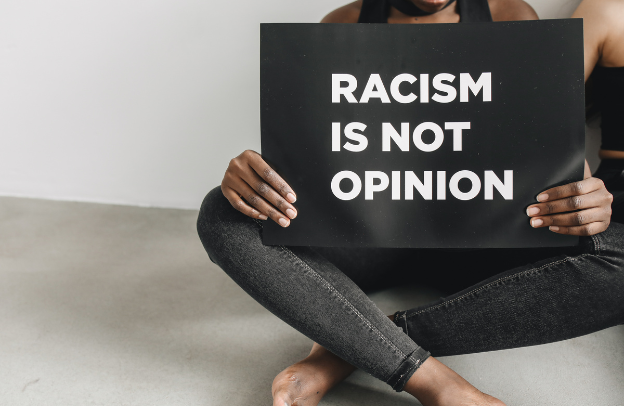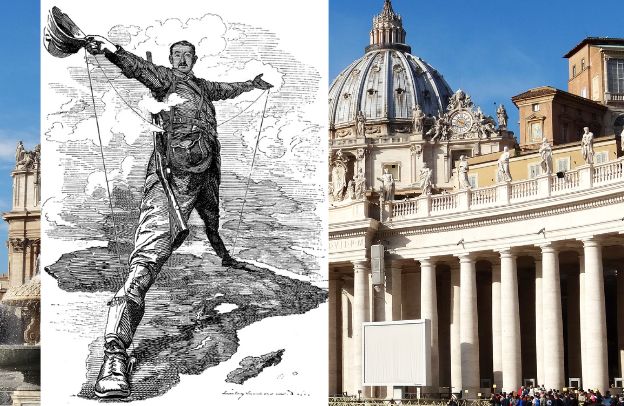Religious Endorsement Of Slavery As A Legitimized Business Both In Islam And Christianity

This is part five in the series “Racism And Slavery: Reflection On Human Madness by Stefano Anselmo”. See previous publications to learn more.
Want to learn more about storytelling? Start by downloading the first chapter of The Storytelling Mastery.
Here is a list of all the articles in the series – Racism And Slavery: Reflection On Human Madness by Stefano Anselmo:
- Racism And Slavery: Reflection On Human Madness by Stefano Anselmo
- What Racism Requires: Religion And Science Were To Go Hand In Hand
- Racism And Slavery: How The Hamitic Theory Began To Crumble
- In America Before Columbus: Exploring European Racist Stereotypes
- Racism And Slavery: African Crisis Is An Invention Of The West
- Our House Slaves: European Centuries Of Heritage
- Religious Endorsement Of Slavery As A Legitimized Business Both In Islam And Christianity
In both Islam and Christianity, historical interpretations and societal norms have led to the religious endorsement of slavery, legitimizing it as a business practice. Within Islam, the Quran and Hadiths contain references to slavery, providing guidelines on the treatment of slaves.
While Islam encouraged the humane treatment of slaves and advocated for their liberation through various means, the institution of slavery itself was not explicitly condemned. Consequently, in many Islamic societies, slavery became entrenched as an accepted practice, with slaves often serving as laborers, concubines, or soldiers.
The economic benefits derived from slavery, coupled with religious interpretations that did not outright prohibit it, contributed to its acceptance within Islamic societies as a legitimate business endeavor.
Similarly, within Christianity, historical interpretations of biblical passages allowed for the religious endorsement of slavery. While some Christian denominations and individuals vehemently opposed slavery, others justified it by citing passages from the Bible that appeared to condone or regulate the practice.
For example, in the Old Testament, there are regulations regarding the treatment of slaves, and the New Testament contains verses advising slaves to obey their masters. These interpretations provided a religious framework for the institution of slavery, enabling its integration into the economic systems of Christian societies.
Consequently, throughout history, slavery thrived as a business enterprise in Christian-majority regions, with slave labor driving agricultural production, domestic service, and various industries.
Are you wondering why you don’t hear many African Muslims and Christians vocal about these? Well, there could be several reasons. See these three for examples:
Complexity of Historical Context
The history of slavery within Islam and Christianity is nuanced and multifaceted. While both religions have scriptures that have been used to justify slavery, they also contain teachings that promote justice, equality, and compassion.
Discussing the role of slavery within religious contexts requires a careful examination of historical circumstances, cultural influences, and interpretations of religious texts. Many African Muslims and Christians may find this topic daunting and may avoid discussing it due to its complexity.
Sensitivity and Emotional Impact:
Slavery is a deeply painful and traumatic part of Africa’s history. Many Africans, particularly those in the diaspora are descendants of those who were enslaved or directly affected by the transatlantic slave trade.
Discussing the religious endorsement of slavery can evoke feelings of anger, shame, and sorrow, especially considering the long-lasting impact of slavery on African societies.
Consequently, individuals may avoid conversations about this topic to protect themselves and others from experiencing emotional distress.
Contemporary Social and Political Dynamics:
In many African countries, there are ongoing social and political challenges that take precedence over discussions about historical issues like slavery. Issues such as poverty, corruption, ethnic tensions, and conflict often dominate public discourse and demand immediate attention.
As a result, discussions about the historical endorsement of slavery within Islam and Christianity may be sidelined in favor of addressing more pressing contemporary issues. Additionally, there may be concerns about how discussing sensitive historical topics could exacerbate religious or ethnic tensions in diverse societies, leading some individuals to avoid such discussions altogether.
With that said, let’s return to the concluding part of Stefano’s reflection: Racism And Slavery: Reflection On Human Madness by Stefano Anselmo.
Islam and Christianity
The prophet Muhammad bought, sold, captured, and himself had slaves. Because of this, in the Islamic world, there seems to be an insurmountable philosophical and theological barrier concerning slavery.
It follows that, according to some exegetical readings, one could not doubt the morality of slavery since certain passages of the Quran “regulate” the behavior of the believer toward their slaves by providing instructions.
Moreover, according to the secular Islamic tradition, only non-Muslims could be reduced to slavery (just as it was for Christianity towards non-Christians), although slavery gradually declined in more recent times.
The Quran contains many passages describing the liberation of slaves as an act of philanthropic generosity, but overall, slavery is accepted and regulated, especially female sexual slavery. Slavery in Islam seems to be legitimized by various passages of the Quran.
Some verses seem to urge believers to free slaves as an act of redemption for their sins. For example, Abu Bakr, the Prophet’s closest friend and first caliph, redeemed numerous slaves. However, the nations of the Arabian Peninsula were among the last to outlaw slavery.
Despite this formal prohibition, cases of slavery and human trafficking persist (even today) in Sudan and Mauritania, where it was abolished in the 1980s but is still practiced, obviously by the Moors against the blacks. However, the 2005 US Department of State describes Saudi Arabia as the 3rd country with the most human trafficking.
The Bible
The Old Testament provides precise rules on how to manage a slave: the Ten Commandments, only prohibit coveting others’ slaves, a precept that automatically legitimizes the existence of slavery and the ownership of slaves. The New Testament also legitimizes slavery and exhorts slaves to obey their masters [Note 4].
Additionally, Fathers and Doctors of the Church, as well as popes and councils, have justified slavery on these scriptural bases and also as a result of original sin or Noah’s curse on his son Ham[Note 5].[27] In his Summa Theologica, Thomas Aquinas sees slavery (and therefore justifies it) as “a punishment for sin” (IIª-IIae q. 189 a. 6 ad 2.). Saint Augustine wrote: “It must be understood that the condition of slavery was imposed on sinful man. […]
So, the first cause of slavery is sin, whereby man is subjected to a man with a bond of subjection, but this does not happen without the judgment of God, in whom there is no injustice.” In other words, the fault lies not with the one who made you a slave, but you must blame yourself because, having sinned, God punished you.
Paul of Tarsus, one of the most important missionaries of Christianity, in his letters of the New Testament, acknowledges the legitimacy of slavery and prescribes obedience to slaves towards their masters and not to rebel.
Biblical scholar Bart Ehrman emphasizes how “Paul not only does not condemn slavery in general, but he does not even denounce its spread among the believers in Jesus. […] Paul shows a certain insensitivity to the injustice present in the society in which he lives. […] For him, it is taken for granted that slaves should remain slaves and that men should continue to be considered superior to women,” and the interconfessional Tob Bible agrees that “Paul does not at all ask for the direct abolition of the institution of slavery, then so widespread.” “Thus the popes reinterpreted the Bible to profit from the slave trade,” says Nigerian Catholic priest Pius Adiele Onyemechi, who practices in Germany, in the Baden-Württemberg region.
His investigation “The Popes, the Catholic Church, and the Transatlantic Enslavement of Black Africans 1418-1839” (pp. XVI/590, Olms, 2017), which already provokes discussions among historians, overturns the old dogma that the Papacy was essentially uninvolved in the greatest massacre of all time: the slave trade.
A secular tragedy that – as the great Danish writer Thorkild Hansen recalls in his classic trilogy on slavery – has sown over 80 million deaths.
Women
African history has almost always been reported to us by misogynistic historians faithful to one of the three major religions, all markedly misogynistic and worshiping a man-God (the Christian one with a beard). Very little is known about women. However, in antiquity, Africa hosted some of the finest minds in the world.
African women played a significant role in the continent’s history. Queens were among the pioneers, managing their territories with precision and patriotism. Their power has left an eternal mark on history. Some of them were leaders and warriors; some acted as goddesses and mediators tasked with protecting the nation and fighting against oppression and colonialism.
Want to learn more about storytelling? Start by downloading the first chapter of The Storytelling Mastery.




